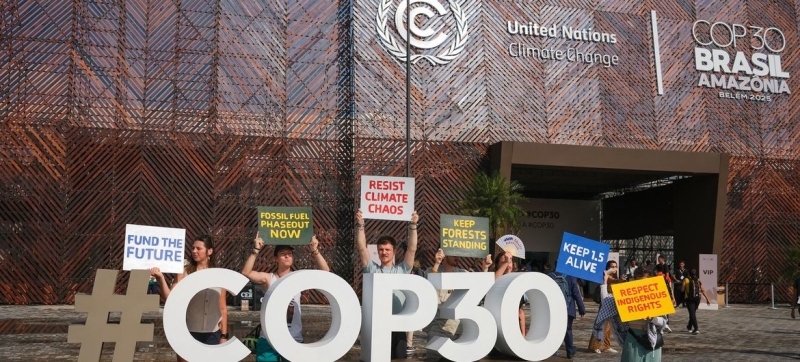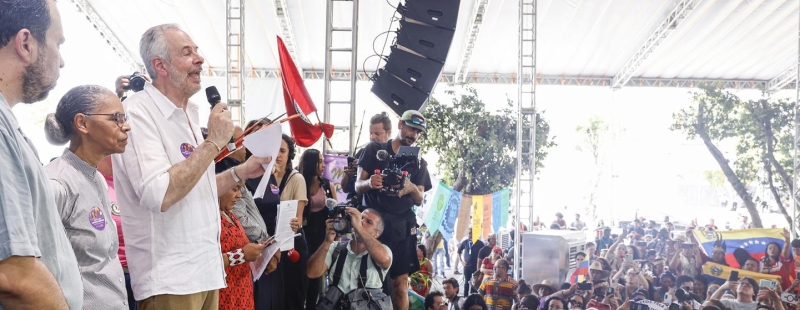
Demonstration outside the Hangar conference center in Belém, where the UN Climate Conference is taking place. The final stage of negotiations at the UN Climate Conference: concrete decisions are expected from delegates Climate and Environment
As the UN Climate Conference (COP 30) enters its final phase this week, the UN is reminding us that time is running out to achieve climate justice.
In the negotiating rooms, according to the Executive Secretariat of the United Nations Framework Convention on Climate Change (UNFCCC) Simon Still, there is a “deep understanding that … that climate cooperation can stand the test of a divided world.”
“There is no time for procrastination”
On Monday, the so-called “high-level segment” started as part of the conference in Belem, Brazil, when ministers and other high-ranking representatives of countries take seats at the negotiating table. Still urged delegations not to leave tackling difficult issues until the last minute. He emphasized that it is now completely unacceptable to “play for time or block the process.”
The President of the UN General Assembly, Annalena Burbock, also joined this call. She said that delegates did not have the “luxury” of “inaction” when people were “counting on them.”
According to her, the transition to renewable energy sources is already irreversible, and the necessary funds exist – they just need to be channeled.
Berbock emphasized that developing countries paid last year about $1.4 trillion in foreign debt, and these resources could be effectively used in the fight against climate change and the development of clean energy.
From negotiations to results
Brazil’s Vice President Geraldo Alckmin said COP 30 should mark the beginning of a new era – one in which the world “stops discussing goals and starts achieving them.” This means moving from negotiation to practice, that is, to finding new mechanisms that can accelerate global climate action.
Alckmin reminded delegates of the commitments made in Belém to quadruple the use of sustainable fuels by 2035. So far, 25 countries have joined the initiative.
He also called for creative solutions in the key areas of the bioeconomy and decarbonization, reaffirming Brazil’s commitment to “clean energy, innovation and inclusion.”
Negotiations could continue into the night time
Brazilian officials told reporters that two packages of decisions were up for discussion: one dealing with issues covered by the Paris Climate Agreement, the other with additional topics.
Brazil has submitted a draft of the first package, which is expected to be approved midweek. There is a lot of work to be done, and COP 30 President André Correa do Lago said that the conference agenda will have to be adjusted so that delegates can continue negotiations into the night.

COP30 President André Correa do Lago at the closing of the People’s Summit.
People’s Summit on the sidelines of the conference
Outside the official site of COP-30, the Hangar Conference Center, participants in international social movements gathered for the People’s Summit. It was held from November 12 to 16 in order to increase pressure on the negotiators and demand that they make real decisions.
As a result of the summit, the participants prepared their proposals and submitted them to the chairman of the COP-30. Speaking to UN News Service, People’s Summit political committee member Maureen Santos said these proposals will be the basis for monitoring during negotiations this week.
“It seems to me that this conference has become an example of democracy not only for the UN, but for the whole world. This is what multilateralism is all about: when parties are truly engaged, not just at the national level, and when the voices of those directly affected by the climate crisis can be heard and at the same time proposing ways to overcome it,” she said.
Key proposals include expanding the discussion on a just transition to include not only renewable energy, but also issues of employment and working conditions, food sovereignty, land rights and more other.
300 thousand servings of food
More than 25 thousand people took part in the People’s Summit. And on Saturday, more than 70 thousand people took part in the climate justice march – this is the largest action of its kind, Santos said.
Summit participants received 300 thousand free meals. To feed them, NGOs used experience gained from helping victims of the 2024 floods in the state of Rio Grande do Sul.
Rudi Rafael, one of the organizers, said that the site had 21 boilers with a capacity of 500 liters each, and a conveyor belt for packaging ready-made meals dispensed one portion every 26 seconds. The menu included products from local family farmers, including traditional Amazonian ingredients such as jamba, acai and pirarucu.
